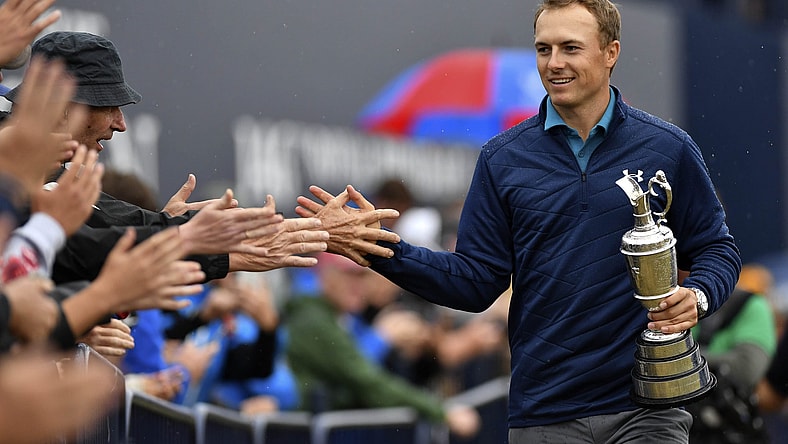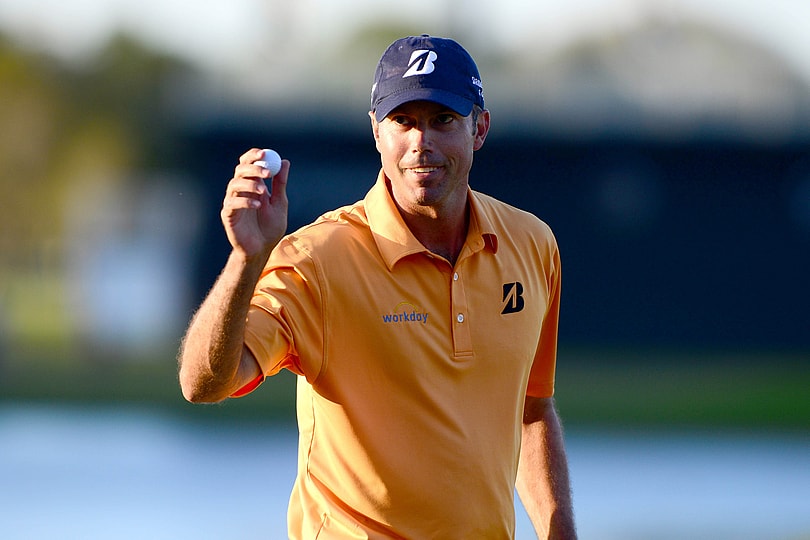
We won’t remember the 2017 British Open as a terribly crisply played event. Still, we’re not going to be forgetting it any time soon.
In the end, Jordan Spieth prevailed over some bizarre circumstances to claim his third career major.
Congratulations to @JordanSpieth on winning The 146th Open at Royal Birkdale! #TheOpen pic.twitter.com/NR3ahfcCGZ
— The Open (@TheOpen) July 23, 2017
What are we going to take away from this Open Championship?
What does Spieth’s win mean for him going forward? Do the poor performances of some of the world’s best point to anything bigger? Rory McIlroy didn’t win. So, why should he be pleased? How does Branden Grace’s record-setting round stack up to other great rounds in major championship play?
What are the major takeaways from the 2017 British Open?
1. Remarkable finish from Jordan Spieth
On Sunday, we saw a crazy hybrid. At times, Spieth resembled the guy who choked down the stretch at the 2016 Masters. Other times, we got the guy who absolutely dominated the same tournament the year before.
The end result was Spieth’s third major.
The one that won it. #TheOpen pic.twitter.com/RfrJdByJXP
— The Open (@TheOpen) July 23, 2017
We have no way of knowing what gets into a golfer’s head and how much it impacts what’s happening on the course. But the three-shot lead that Spieth had entering the day was gone within four holes. After quickly regaining a two-shot lead, he squandered it with a three-putt on the ninth. Then, he fell completely out of the lead with a truly bizarre situation on the 13th (more on that shortly). These had to bring back memories of the 2016 Masters, which did not end up well for Spieth.
But this one did. Spieth made an impressive bogey on 13, then played 13-17 at 5-under par.
As a result, Spieth now joins Rory McIlroy and Phil Mickelson as golfers one major shy of the career grand slam. He’ll get his first crack at it during the PGA Championship in August.
Not bad for a guy still a few days short of his 24th birthday.
2. Mess at the 13th hole
If we’re being politically correct, we can call what happened on the 13th hole a bizarre situation. If we’re being honest, we must call it a debacle.
After a wayward tee shot, Spieth took a long time to find his ball. Then, he took a long time to decide to take an unplayable lie (which was the right decision). Once that decision was made, finding the right place to drop it became a protracted event. Then, re-dropping it after getting free line of sight relief from the original drop spot was another event.
As if that wasn’t enough, then we had to go through yet another long, drawn-out process for Spieth to get his yardage. While all this was going on, Matt Kuchar was taking a knee, just waiting.
First of all, we have to commend Kuchar for being so good natured about it. Had Spieth been playing with someone like Bubba Watson, we might have had more of a conflict.
Secondly, with complete respect to the stage and acknowledging that he made the right call, Spieth should have made a quicker decision. A single hole of golf should not take 30 minutes to play.
Finally, golf needs to figure something out to speed the process up. Everyone knew that the ball was going to be moved from where it was initially dropped. So, why couldn’t that step have been skipped?
If your goal is to grow the game of golf, this isn’t helping. Kids aren’t sitting at home on the edge of their seats wondering how a drop is going to work out. Taking 20 minutes between shots isn’t good for anyone.
3. Matt Kuchar impresses in defeat

Kuchar left the 13th hole with a one-stroke lead. He ended up three shots behind Spieth. But despite that tremendous swing over the final five holes, he did not choke.
Kuchar made a par on that 13th hole and after that, played the final five at one-under par. That should be enough to win. Unfortunately for him, Spieth had other ideas. But Kuchar’s good play should be commended.
Kuchar applied a great deal of pressure to Spieth throughout Sunday’s round. He turned the final round into quite a battle. It was a different kind of battle than the one we saw in 2016 between Henrik Stenson and Phil Mickelson, but it was a battle nonetheless.
With Sergio Garcia’s victory at the Masters, Kuchar may well be the best golfer going without a major. Don’t be surprised if we can’t say that for much longer. Kuchar hasn’t always brought his best game to the majors. But his performance at Birkdale showed that he has the game to win one.
4. Branden Grace makes history
In Saturday’s third round, Grace did something never before done in major championship play. He fired a 62.
The scorecard of @BrandenGrace's historic 62 from Round 3 of #TheOpen. pic.twitter.com/FdI0bBjnDp
— The Open (@TheOpen) July 22, 2017
Now, where does this round rank in major championship history?
Well, if you’ve been on social media, you’ve no doubt seen someone make mention of the fact that Royal Birkdale is a Par 70, so a 62 is eight-under par. While that’s still a great round of golf, eight-under has been shot in majors before.
That’s a factual statement, but it’s not exactly an argument ender.
At one point, Birkdale played as a Par 73. With the advancements in club and ball technology, courses have taken to trimming par-fives to par-fours and to a lesser extent, par-fours into par-threes. The holes themselves, though, have actually gotten longer. So, while the score in relation to par is what we see, it’s not the end-all, be-all argument.
Now, where does Grace’s round rank in history? It’s still hard to compare it to Johnny Miller’s 63 in the 1973 U.S. Open or Henrik Stenson in the 2016 British Open. Grace’s score came in the third round when he was not seriously in contention. Stenson won by a few shots but was facing constant pressure from Phil Mickelson throughout the day. Meanwhile, if Miller’s 63 had been a 64, he would have been in an 18-hole playoff.
But that’s all subjective commentary on value. Objectively, Grace is the proud owner of the greatest round in major championship history.
4. Is Haotong Li’s performance a sign of things to come?
When you start the day 12 shots out of the lead, you’re not exactly expecting to be the clubhouse leader until the final pairing finishes. But that’s what happens when you shoot a 63. It earns you the praise of the world’s best golfers.
Brilliant final round from my good friend @haotong_li @TheOpen #63 🔥
— Justin ROSE (@JustinRose99) July 23, 2017
So, what does this mean going forward? Well, Li will turn 22 in August. So, we’ll be seeing him a lot in the future. But the bigger question is, what will we see out of Li’s countrymen in the future?
Golf has grown in Asia over the last few decades. In both the men’s and women’s game, we’ve seen an influx of Japanese and South Korean players. But as far as golf goes, China — the world’s biggest country — has remained a relatively untapped market. With the performance of Li, that will not be the case for long.
Chinese golfers have a role model to look up to. They have one of their own to cheer for. That’s only going to make the game bigger in China. That all means that golf, already one of the world’s most global games, is about to get even more global.
5. Rory McIlroy finishes with a positive

McIlroy finished tied for fourth despite bogeying five of the first six holes during Thursday’s opening round. Normally, we would look at this as a huge opportunity for one of the world’s best players.
But with McIlroy, it’s not that simple.
McIlroy didn’t enter The Open Championship on top of his game. He had missed three of four cuts coming into Birkdale, including each of his last two events. After that start, it would have been very easy for McIlroy to pack it in to make it four of five missed cuts and three in a row.
Obviously, that didn’t happen.
Not only did McIlroy make the cut, but he made himself into a fringe contender by the end of the weekend.
He wasn’t quite good enough to win after that slow start. But looking ahead at the rest of the season, his performance at the British Open bodes well for McIlroy. It’s a sign that he’s maybe found something in his game that had been missing in recent weeks. Remember, the PGA Championship is at Quail Hollow, a venue where McIlroy has won twice and holds the course record.
6. Letdown finish for Dustin Johnson
If you’ve followed golf for long enough, you know that it’s not like any other sport. The world’s No. 1-ranked golfer still faces long odds to win any given tournament. Johnson finishing down in the middle of the pack can be excused.
But the last round is hard to overlook. DJ entered Sunday well back of the lead. Nobody was expecting him to win. Still, expecting a decent final round was not unreasonable.
 But Johnson double-bogeyed the first hole and never got back on track. Following that double, he made six more bogeys against only one birdie to finish the final round at 77. That’s just not the kind of play that we expect to see from Johnson.
But Johnson double-bogeyed the first hole and never got back on track. Following that double, he made six more bogeys against only one birdie to finish the final round at 77. That’s just not the kind of play that we expect to see from Johnson.
Johnson followed up his 2016 U.S. Open win with a tie for ninth at the Open Championship. Since then, though, he’s missed one major with an injury (2017 Masters), missed two cuts (2016 PGA, 2017 U.S. Open), and finished tied for 54th (2017 Open Championship). Winning the U.S. Open should have loosened him up at future majors. But if it has, we have not seen it in the results.
7. Bittersweet performance of Hideki Matsuyama
Sunday didn’t go a lot better for the second-ranked player in the world. Much like Johnson, Matsuyama started bad, recording a triple-bogey on the opening hole.
But unlike Johnson, Matsuyama bounced back with a reasonable round. After the triple, Matsuyama played the final 17 holes at one-under. He finished the day at two-over par, the tournament at two-under, tied for 14th.
He’s the No. 2 ranked player in the world so it’s easy to forget this, but Matsuyama is still developing a major championship resume. His first British Open came in 2013, when he tied for 6th. Since then, he’s finished tied for 38th, tied for 18th, and missed a cut. Now, he’s got a tie for 14th mixed in there.
Matsuyama will no doubt look back at the first hole with disappointment, and with good reason. But he’s got a decent history at the Open Championship for a guy who can’t have much experience in links golf.
8. Disappointing two days for Justin Thomas
We can say what we want about Johnson and Matsuyama’s finish. But at least they were around for the weekend. The same can not be said for Thomas.
Before a ball was ever struck, Thomas grabbed plenty of attention at Birkdale. He made it known that he’d be sporting a coat and tie look for the opening round on Thursday. We have to admit, he pulled it off.
#ThrowbackThursday look for @JustinThomas34 at #TheOpen. pic.twitter.com/eSnuTbrRqs
— PGA TOUR (@PGATOUR) July 20, 2017
And Thomas delivered while paying homage to the game’s past. He fired an opening round 67 and was only two shots off of the lead.
Then, Round 2 happened. Thomas fired an 80 (which included a nine on the par-four sixth hole) and missed the cut. Those kind of things happen at major championships sometimes, but usually with late qualifiers. Thomas entered the week as the No. 13-ranked golfer in the world. If you’re that good and close to the opening-round lead, you should be around to play the weekend.